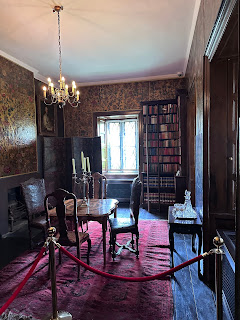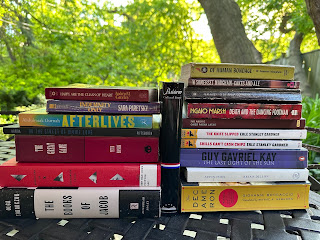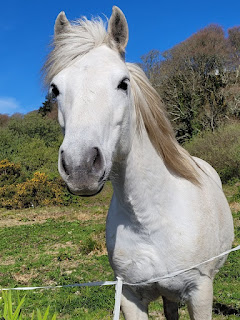"I traveled for two years in Tibet, therefore, and amused myself by visiting Lhassa, and spending some days with the head lama. You may have read of the remarkable explorations of a Norwegian named Sigerson, but I am sure that it never occurred to you that you were receiving news of your friend."
Sherlock Holmes to Dr. Watson, The Adventure of the Empty House
I recently came across mention of Jamyang Norbu's
The Mandala of Sherlock Holmes: The Missing Years. (Somebody's blog, I'm sure. Was it yours?) It sounded fun, and my library had it. It's the story of those two years Sherlock Holmes spent in Tibet. I had just started it when I realized that Rudyard Kipling's
Kim was equally a precursor to
The Mandala of Sherlock Holmes as were the original Holmes stories. I pulled that book off the shelf. Was I going to reread
Kim? Well, yes, as it turned out, I was...
Kim
"I am Kim, I am Kim. And what is Kim?"
Kimball O'Hara is the son of an Irish soldier in India. His mother dies when he's a babe, and soon after his father runs off the rails with drink and opium, and also dies. Kim is looked after by an opium-addicted aunt, but he's a wild child, more fluent in Hindi than in English, street smart, but constitutionally allergic to school. His sign is War, and, though he doesn't know why, his emblem is a Red Bull on a Green Field.
"Sooner or later, if he chose, he could escape into the great, grey, formless India, beyond tents and padres and colonels."
At the beginning of the novel, Kim is maybe thirteen, and he meets a Tibetan lama, who's on a quest of his own to find the River of the Arrow, whose water washes away all sin and frees one from the wheel of life. (Sin is Kipling's term, and perhaps not quite doctrinal Buddhism.) Kim is impressed--we are, too--with the holy man's holiness, and decides to follow him as his disciple, his chela.
Teshoo Lama (we only learn the lama's name after a while) and Kim travel south in India on their respective quests. One of the traditional roles of a chela is to beg for his master, and Kim is particularly good at this; eventually they accompany an amusing old woman traveling to visit her daughter in the south; she's a member of a minor Northern royal family. Kim also finds the Red Bull in a Green Field: it's the flag of his father's regiment, and the two chaplains of the regiment are agreed the son of a Sahib, of their regiment, even an Irish one, can't be allowed to go gallivanting around India as a beggar. (That's when Kim thinks he can always disappear into 'great, grey, formless India'.) But somebody in the British spy network realizes Kim could be useful, and with the help of Teshoo Lama arranges for an education Kim can stomach.
Kipling's politics are not ours. And though I do think Kipling's politics became more problematic as he aged, he does not doubt Britain's right to rule India, and that Kim is being prepped to perpetuate this rule is not a problem within the novel. But Kipling also clearly loves India and that helps. He loves the people, the customs, the food:
"Kim yearned for the caress of soft mud squishing up between the toes, as his mouth watered for mutton, stewed with butter and cabbages, for rice speckled with strong-scented cardamoms, for the saffron-tinted rice, garlic and onions, and the forbidden greasy sweatmeats of the bazars."
(Kim is a teenage boy, so perhaps all food is good food, but still, how sensual--and how un-English--is that description of food.)
"'And who are thy people, Friend of all of the World?"
"This great and beautiful land," said Kim.
The novel is a bit of a Bildungsroman, and 'What is Kim?' is the question. What should he be, and how is he educated to become what he should be? Does Kim follow his lama, who, though with the occasional charming bit of backsliding, is attempting to detach himself from the world, to get off the 'Wheel of Life.' But no,
"This was seeing the world in real truth; this was life as he would have it--bustling and shouting, the buckling of belts, and beating of bullocks and creaking of wheels, lighting of fires and cooking of food, and new sights at every turn of the approving eye."
Though I was charmed with the lama and was half-hoping he would win over Kim's soul, maybe a Kim with that attitude really does need to be an agent of the secret service. (I also have to say I just love that sentence--the rhythm, the alliteration.) Anyway, Kim comes into adulthood, and goes 'far and far into the North, playing the Great Game.'
It's a great novel, I think, even (after thirty years?) on rereading. It may also help us swallow Kipling's politics--at least these days--that the clear villain is an agent of Russian imperialism.
And so, once I'd finished Kim, it was back to:
The Mandala of Sherlock Holmes
I didn't say much about the secret service agents in the description of Kim, but they mostly reappear here. It's Colonel Creighton who recognizes Kim's potential as an agent and who's been informed it's Sherlock Holmes coming to India. It's Lurgan Sahib who trains Kim in disguises and who has a long conversation with Holmes on that subject among others. Kim himself even briefly shows up (I think) under his alias K.21. But the main carryover is Hurree Chunder Mookerjee, a Bengali in the secret service. He's Kim's immediate superior once Kim has become a fully-fledged agent, and it's Hurree who accompanies Holmes to Lhassa, as his knowledgeable local guide and protector. (Though Holmes does more to protect Hurree than vice-versa.) Hurree is also the narrator of the story: since Watson was not available, he is our Watson.
An attempt is made to assassinate Holmes almost immediately on his arrival in India. Holmes quickly recognizes it as the work of Moriarty's henchman Colonel Sebastian Moran (the villain in 'The Adventure of the Empty House') but is unable to pin it decisively on Moran, who's a member in good-standing in Indian society. ('Formerly 1st Bangalore Pioneers. Author of Heavy Game of the Western Himalayas.') Anyway, Holmes can't put away Moran in India, because Moran has to reappear in London for 'Empty House.' Was this 'the repulsive story of the red leech' that Watson mentions in 'The Adventure of the Golden Pince-Nez'? Maybe!
Holmes is still determined to travel to Lhassa, and maybe it's for the best: he can get out of Moran's reach. But of course he doesn't, and further attempts are made on Holmes' life. Also on the way to Tibet, where supposedly Westerners are not at that time allowed, Holmes and Hurree discover that the Grand Lama in fact wants Holmes to come to Lhassa because he's worried about the current Dalai Lama (at that time only thirteen years old.)
Holmes gets to Lhassa and foils that plot. (Well, he is Sherlock Holmes. Did you doubt?) The clear villain in this is an agent of Chinese imperialism. (Though there is also a surprise villain, whom I won't mention.)
Jamyang Norbu was born in Tibet, in 1949, but left at a very young age, before the Chinese takeover. He mostly grew up in Dharamshala in a community of Tibetan exiles, and according to the author bio on the back flap was living there in 1999 when this book came out. (Wikipedia
now has him living in the U.S.) He's been involved with the Tibetan government-in-exile and this would seem to be his only novel; his other books are about the current situation in Tibet. That the villain was an agent of Chinese imperialism is perhaps unsurprising.
If a fan-fiction mashup of Kipling's Kim and the Sherlock Holmes stories, with maybe just a pinch of the fantastic from H. Rider Haggard, appeals to you (as it did to me) you will definitely not be disappointed.
And Carrying On...
I reread the relevant stories from the Sherlock Holmes canon (primarily 'The Final Problem' and 'The Adventure of the Empty Room', as well as parts of Peter Hopkirk's wonderful history The Great Game: The Struggle for Empire in Central Asia.) Does that mean I'm about to reread those books? It might!





























